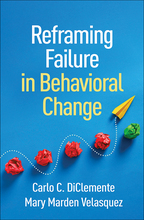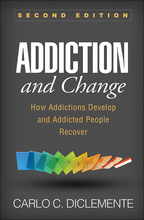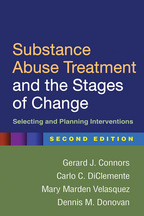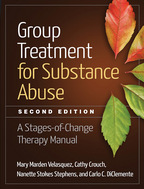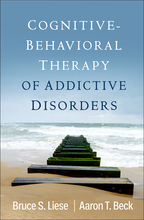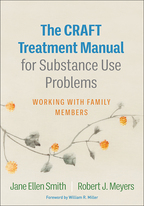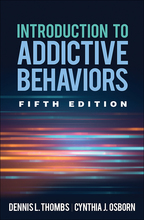Reframing Failure in Behavioral Change
Carlo C. DiClemente and Mary Marden Velasquez
HardcoverPaperbacke-bookprint + e-book
Hardcover
pre-orderMay 20, 2026
ISBN 9781462562794
Price: $60.00 226 Pages
Size: 6" x 9"
Paperback
pre-orderMay 20, 2026
ISBN 9781462562787
Price: $40.00226 Pages
Size: 6" x 9"
e-book
pre-orderMay 20, 2026
PDF and Accessible ePub ?
Price: $40.00 226 Pages
ePub is Global Certified Accessible
print + e-book $80.00 $48.00
pre-orderPaperback + e-Book (PDF and Accessible ePub) ?
Price: 226 Pages
ePub is Global Certified Accessible
Sign up for emails on upcoming titles on Addictions (with special discounts)!
“This inspiring work reimagines what it means to fail. Across nearly every kind of health behavior, relapse is the rule rather than the exception—but it can also be a teacher. This book is special because it reframes failure as part of the process of change, rather than the end of it. I recommend this book for practitioners and students in public health, social work, psychology, and health promotion. It would work well in classrooms, given its blend of storytelling, science, and practical tools.”

—Scott T. Walters, PhD, Regents Professor, College of Public Health, UNT Health Fort Worth
“We have only to reflect on our own experiences to acknowledge the difficulty of change. This book shifts the conversation about the concept of relapse. The authors draw from the addictions literature, the transtheoretical model, and elements of learning theory to destigmatize interruptions that may occur during the behavior change process. In the field of addiction, this is a critically important message that can support clinicians and clients alike.”

—Molly Magill, LICSW, PhD, Department of Behavioral and Social Sciences, Brown University School of Public Health
“Phenomenally engaging, clear, and concise. True to its title, this excellent book from leaders in the field focuses on the heart of the matter regarding behavior change—change is hard, and failure is common along the way. Despite this seemingly grim reality, the book describes theory and tangible interventions that can promote and sustain successful behavior change. In doing so, it provides a great deal of hope regarding people's capacity to change, even when the pathway is difficult.”

—Katie Witkiewitz, PhD, Distinguished Professor of Psychology and Director, Center on Alcohol, Substance use, And Addiction, University of New Mexico
“The authors challenge conventional thinking with the powerful insight that failure can be the source of innovation for future success. This book emphasizes the dynamic nature of the transtheoretical model, showing how individuals recycle through the stages of change and how this process is essential to growth. DiClemente and Velasquez illuminate the interplay between stages and processes, helping practitioners understand that progress often emerges from persistence through failure. This book is not just insightful—it’s indispensable.”

—Cynthia Moreno Tuohy, Senior Consultant and Former Executive Director, NAADAC, the Association for Addiction Professionals
—Scott T. Walters, PhD, Regents Professor, College of Public Health, UNT Health Fort Worth
“We have only to reflect on our own experiences to acknowledge the difficulty of change. This book shifts the conversation about the concept of relapse. The authors draw from the addictions literature, the transtheoretical model, and elements of learning theory to destigmatize interruptions that may occur during the behavior change process. In the field of addiction, this is a critically important message that can support clinicians and clients alike.”
—Molly Magill, LICSW, PhD, Department of Behavioral and Social Sciences, Brown University School of Public Health
“Phenomenally engaging, clear, and concise. True to its title, this excellent book from leaders in the field focuses on the heart of the matter regarding behavior change—change is hard, and failure is common along the way. Despite this seemingly grim reality, the book describes theory and tangible interventions that can promote and sustain successful behavior change. In doing so, it provides a great deal of hope regarding people's capacity to change, even when the pathway is difficult.”
—Katie Witkiewitz, PhD, Distinguished Professor of Psychology and Director, Center on Alcohol, Substance use, And Addiction, University of New Mexico
“The authors challenge conventional thinking with the powerful insight that failure can be the source of innovation for future success. This book emphasizes the dynamic nature of the transtheoretical model, showing how individuals recycle through the stages of change and how this process is essential to growth. DiClemente and Velasquez illuminate the interplay between stages and processes, helping practitioners understand that progress often emerges from persistence through failure. This book is not just insightful—it’s indispensable.”
—Cynthia Moreno Tuohy, Senior Consultant and Former Executive Director, NAADAC, the Association for Addiction Professionals

